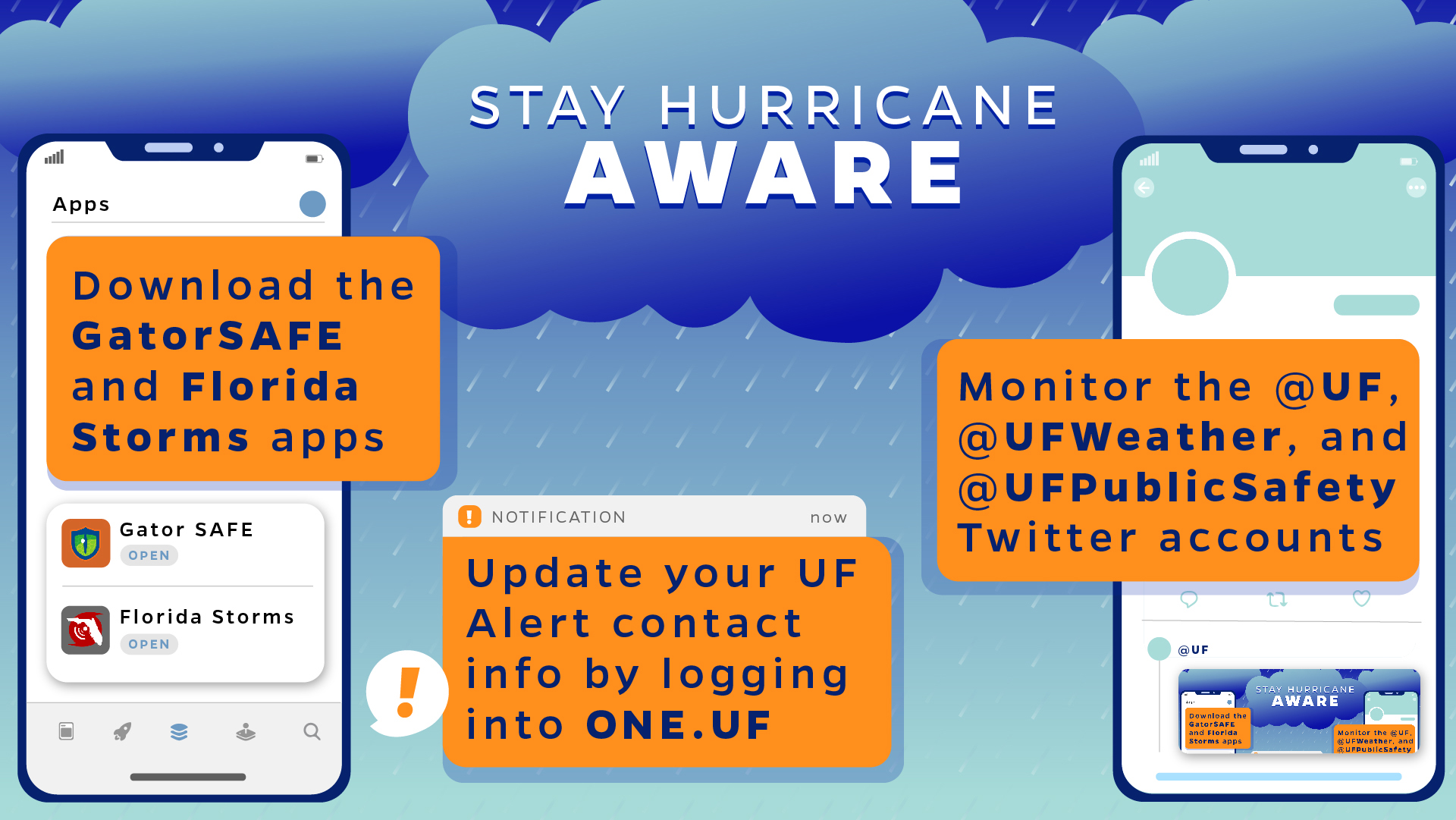Students: Here's how to prepare for a hurricane

.
A quiet start to storm season recently came to an end with two named storms in the Atlantic this week.
While storms Danielle and Earl are too far to be considered a threat to the Sunshine State, these have served as important reminders that peak hurricane season has arrived. September and October have historically been active months for tropical weather in Florida.
Whether you are new to campus or returning this fall, it is important to know how to prepare for a hurricane, as safety at the University of Florida is a shared responsibility.
An essential part of being prepared for hurricane season in Florida is having a basic emergency kit with a minimum of three days’ worth of necessities that include water and shelf-stable food, such as canned or pouched food and cereal or snack bars. (It is important to note that food in a refrigerator will spoil in the event of a power loss. Additionally, power may not return fast enough to enable the use of electric stoves.)
The items of your toolkit may vary, but other essentials may include a battery-powered radio, a flashlight and extra batteries, and a portable cell phone charger, among others. If you haven’t done so already, download the GatorSafe App, which offers a variety of safety resources.
Also, if you’re new to Florida or just unfamiliar with hurricanes, take the time to familiarize yourself with the terminology used during storms — such as the “cone of uncertainty” or the difference between a “watch” and “warning”— and what they mean.
A storm is coming. Have a hurricane preparation plan
UF actively tracks all storms and inclement weather systems, and communicates with the university community when storms threaten the state of Florida.
Information regarding storms of concern to the university community will be found on our homepage, ufl.edu. Also, ongoing and archived severe weather updates can be found at updates.emergency.ufl.edu.
Officials at UF will make decisions of class cancellations or campus closures when there is enough information regarding the track of the storm and its potential impact. The campus community will receive notifications through the UF Alert notification system, which include text messages and emails, and a banner notification on UF’s homepage, ufl.edu.
The conditions of a storm can change rapidly. Regularly check for any updates through the aforementioned resources.
Have a plan of action that includes your needs, those of pets (if you have any) and where you will take refuge. Communicate your plans and location to family and friends. In most cases, students living in residence halls will shelter in place. Shelters will open on campus as needed for UF students, faculty and staff, and their families.
(For more information on having a plan click here.)
(A pre-storm preparation for students in UF housing, which addresses where you can park your vehicle and what items you should bring indoors, can also be found here.)
The storm is here. Now what?
Stay indoors and stay informed.
Do not travel during the storm.
Understand that if you get injured during a storm, it may be difficult to reach emergency care. Winds and other storm conditions often prevent emergency services, such as first responders or ambulances, from operating in the middle of a storm.
Ensure that you are riding out the storm in a secure location that will allow you to take refuge away from windows and doors.
It’s bright and sunny again. What’s next?
Once the storm has passed, you are encouraged to document any damage with pictures and to communicate it with officials. Check- in on your friends and family to let them know the threat has passed. Check on your neighbors who may need help.
Avoid hopping in a car to survey neighboring damage. After a storm, there may be hazards on the road, such as fallen trees or branches, and electric poles or live wires. Additionally, you may interfere with emergency responders or become injured yourself.
Do not play in standing water. While wakeboarding in standing water may seem like quintessential TikTok #Florida material, lurking dangers could include overflowing wastewater, sharp debris and even sinkholes.
Finally, expect delays and inconveniences. In some cases, power may not be restored immediately after a storm. While there are emergency generators on campus, they are designed to keep critical life safety systems such as emergency lighting and fire alarms fully operational during a power outage.
University officials will notify through UF Alert when the campus or affected facilities will resume normal operations.
Now that you know how to prepare for a hurricane, don’t be caught off guard during a storm. Ensure you are enrolled to receive UF Alerts, as having accurate information during emergencies is vital. And remember that hurricane preparation and safety is a shared responsibility.
For more information, visit: https://emergency.ufl.edu/get-ready/
